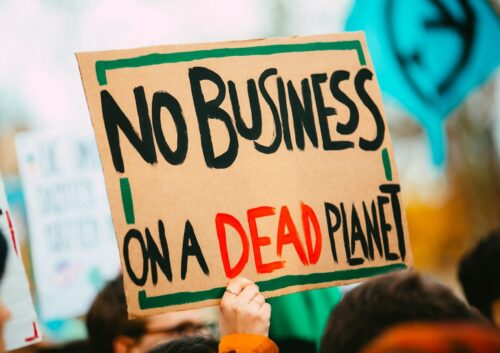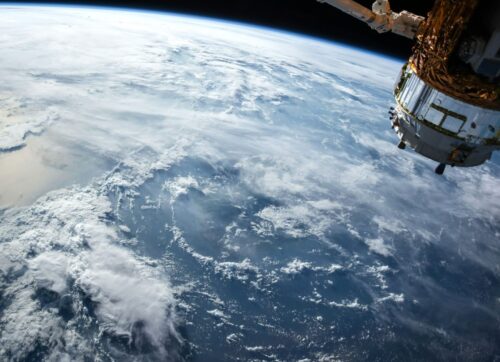Few things have escaped environmentalists’ scorn, and even cows have not been exempt from blame for climate change. Emissions from livestock production have become an increasing focus of efforts to fight climate change. [emphasis, links added]
The United Nations Food and Agriculture Organization (FAO) estimates that 11.1% of emissions worldwide come from livestock production, and the organization released a report last year urging Americans to eat less meat.
If people aren’t eating meat, the argument goes, then fewer cows are produced. If there are fewer cows, there are fewer emissions.
However, research by pro-agribusiness outfits Alltech and Archbold suggests that the thinking on reducing emissions at the source is missing a bigger picture on cattle’s relationship with the land, and possibly, by removing grazing from pastures, emissions will actually go up.
Complex process
Besides trying to convince people to change their diets so we can get rid of more cows, other efforts seek to attack the emissions at the source.
The Bill and Melinda Gates Foundation awarded a $4.8 million grant to a London-based company to develop a gas mask as a sort of carbon capture technology — on a cow.
Other research is looking into food additives that go into the cows’ feed as a way to reduce the amount of emissions coming out of the animal.
In Ireland, dairy farmers were looking at possibly having to kill a lot of cattle to come into compliance with emission reduction targets.
Dr. Vaughn Holder, research project manager for beef nutrition at Alltech, and Dr. Betsey Boughton, director of agroecology at Archbold, studied the impacts that cattle production has on the ecosystem on a wetlands pasture at Buck Island Ranch, about 150 miles northwest of Miami, Florida.
The researchers found that 19%-30% of methane emissions were from the cattle, but the rest was from the wetland soils.
If the cows are removed, their research shows, it increases the amount of methane the wetland ecosystems give off.
Methane, which is more potent in terms of greenhouse warming than carbon dioxide, lasts only about 12 years. So reducing methane can have a more immediate impact on warming than reducing carbon dioxide.
Cattle emissions, Holder told Just the News, are often thought of like fossil fuel emissions. When we burn fossil fuels, the emissions go into the air. So eliminating a coal-fired power plant, for example, removes an emissions source, which produces a drop in emissions.
“There is a far more complex process in agriculture than it is in fossil fuel systems,” Holder said.
Ruminants, as they’re called, which includes cattle and sheep, have a large chamber in front of their stomach that acts as a fermentation factory.
Inside are bacteria, yeasts, fungi, and other microorganisms that help the animals digest grasses that humans can’t. Methane is a natural waste product of that process.
Cattle take a lot of plants humans can’t eat, Holder explained in a series of videos on the Buck Island research, and they turn them into edible proteins humans can consume, increasing global food security. …
Carbon cycle
When cattle graze on land, the plants prioritize root growth over the plant matter above the surface. The deeper the roots, the more plants sequester carbon in the soil through the photosynthesis process.
Grazing also removes grasses from a pasture, which reduces the dead plant matter that falls into the soil and decomposes, which also produces greenhouse gasses.
“It’s a natural process. We’re not saying that’s bad. Wetlands are good. That’s just a natural part of a wetland,” Boughton told Just the News.
At the Buck Island Ranch, Boughton and her team measured the amount of greenhouse gasses emitted on a pasture that had no grazing and compared it to a pasture that had grazing.
What they found is that cattle grazing ends up as a carbon sink, meaning there’s a net reduction in the amount of emissions from that pasture compared to pastures with no cows.
Top photo by Jonas Koel on Unsplash
Read rest at Just The News




















Cattle have been on this Earth for Eons but its only Now according to some idiots their causing Global Warming/Climate Change shows that some people think with their Mouths and not their Brains and wtach way too many showings of Gore and DiCaprio’s fake movies
As I already wrote a few years ago, someone has finally realized that planting trees does NOT help eliminate CO2, and even Bill Gates, albeit half-heartedly, has dared to point it out. Naturally the outcry was minimal, because it would have compromised the enormous business of “green” certifications, which only has the color of the banknotes green; on the other hand, no one dares to say that every time money is moved pollution is generated, but that’s the case, for the people of Greta the narrative works, and how! But let’s now come to a topic that gives me no peace, also because it undermines my beloved Florentine steak. So, for some years now we have been subject to a brainwashing that has the aim of making us replace chickens, steers and rosy pigs with crickets, various baboias and “cultivated” meat (otherwise what would multinationals survive on?). Obviously the crusade is sacred, because it is aimed at protecting the environment. And who will ever be that monster who wants to perpetrate the destruction of the human race and the death of coral reefs?! These crusaders (but I would better call them rhetoricians and sophists), from the height of their knowledge, not a day, hour, minute goes by without explaining to us that the stinks of steers or cows cause frightening tropical cyclones and millions of deaths (obviously based on fake data). Not to mention the billions (oh well, millions) of deaths caused by air pollution (the Po Valley is one of the most polluted areas in Europe, but also among those with the highest life expectancy, but it doesn’t matter). And here a sense of nausea, of deep frustration comes over me. Is it possible that eminent scientists, enlightened politicians and illustrious climatologists have forgotten (as in the case of trees) what a certain Antoine-Laurent de Lavoisier wrote at the end of the 18th century? It seems that in the Errancis cemetery the poor guy is tossing and turning in his grave (if it’s true that farts cause catastrophes, someone show me that poor Lavoisier isn’t moving!). Then, at the age of seven, I read in a booklet on Chemistry for industrial experts, which accompanied my sleepless nights: «Nothing is created, nothing is destroyed, everything is transformed». It’s not that at that age I fully understood the meaning of the postulate, but something in my brain began to move. At that age it is justifiable that a child, not particularly gifted, had not fully understood the meaning of the postulate; less justifiable is that the eminent scientists did not understand it, etc…
And let’s go back to our steers and our cows (but it applies to all animals, farmed and otherwise, including us βρότος). These noble animals feed on fodder, which is nothing more than CO2, transformed, through chlorophyll photosynthesis and solar energy, into carbohydrates. Carbohydrates are transformed by cute animals into meat and various appendages (for the sake of simplicity, we ignore the distinction between ruminants and non-ruminants). Therefore, if the law of mass conservation is still valid (I have not received any updates on this matter), ultimately, meat is nothing more than a more succulent transformation of CO2, which allows us, once eaten , to use… solar energy (despite the fact that some sects, the Breatharians, deny it, we are not yet capable of exploiting it directly for our food)! Obviously, at the end of the cycle (for education I’ll stop here), the CO2 returns to where it was taken from, that is, into the atmosphere. We didn’t create any! If we really want to be picky, and since oxen are no longer used for ploughing, there is the contribution of a few liters of diesel consumed by the combine harvesters. The same goes for methane smells (it transforms back into the carbon dioxide that generated it). Now I ask myself, and it literally drives me crazy with anger, is it possible that no one, and I mean no one, has raised their little finger to remember what in my time we studied in the fourth and fifth grade? Never mind the Greeks, but all this mass of experts, eminent scientists, politicians, etc., etc., who want to teach me how to move, how to eat, how to warm myself, how… haven’t they noticed this monstrous absurdity?! The only (consoling) explanation is that they are simply… you do it. Luckily the farmers and breeders, who perhaps do not know a certain Lavoisier, but who know their fields and their animals well, have slightly “altered” and are instilling (or rather inculcating) in the gray eminences that govern this ramshackle Europe (Europe , let’s not forget, she was raped by Zeus) some doubts.
Interesting comment and if I assume you are Italian? Your command of English is formidable.
You guessed it! Yes, I’m Italian. Unfortunately, I don’t master your language that well; the credit goes entirely to Google translator! Best regards
This article is interesting in at least two ways. It shows the lack of logical thinking and scientific understanding inherent in the anti-meat campaign, but it also upholds the climate alarmist view of “greenhouse gases” that are supposed to worry us. That leaves the article conflicted and of low value.